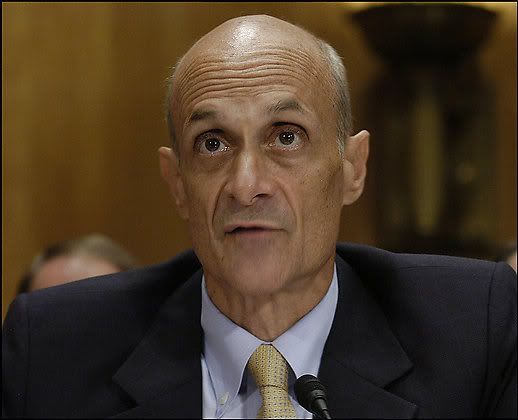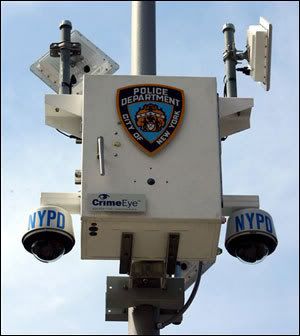They also emphasized that there would be strict rules in place to minimize the extent to which Americans would be caught up in the surveillance.
The dispute illustrates how lawmakers, in a frenetic, end-of-session scramble, passed legislation they may not have fully understood and may have given the administration more surveillance powers than it sought. It also offers a case study in how changing a few words in a complex piece of legislation has the potential to fundamentally alter the Foreign Intelligence Surveillance Act, a landmark national security law. Two weeks after the legislation was signed into law, there is still heated debate over how much power Congress gave to the president.
“This may give the administration even more authority than people thought,” said David Kris, a former senior Justice Department lawyer in the Bush and Clinton administrations and a co-author of “National Security Investigation and Prosecutions,” a new book on surveillance law.
Several legal experts said that by redefining the meaning of “electronic surveillance,” the new law narrows the types of communications covered in the Foreign Intelligence Surveillance Act, known as FISA, by indirectly giving the government the power to use intelligence collection methods far beyond wiretapping that previously required court approval if conducted inside the United States.
These new powers include the collection of business records, physical searches and so-called “trap and trace” operations, analyzing specific calling patterns.
For instance, the legislation would allow the government, under certain circumstances, to demand the business records of an American in Chicago without a warrant if it asserts that the search concerns its surveillance of a person who is in Paris, experts said.
It is possible that some of the changes were the unintended consequences of the rushed legislative process just before this month’s Congressional recess, rather than a purposeful effort by the administration to enhance its ability to spy on Americans.
“We did not cover ourselves in glory,” said one Democratic aide, referring to how the bill was compiled.
But a senior intelligence official who has been involved in the discussions on behalf of the administration said that the legislation was seen solely as a way to speed access to the communications of foreign targets, not to sweep up the communications of Americans by claiming to focus on foreigners.
“I don’t think it’s a fair reading,” the official said. “The intent here was pure: if you’re targeting someone outside the country, the fact that you’re doing the collection inside the country, that shouldn’t matter.” Democratic leaders have said they plan to push for a revision of the legislation as soon as September. “It was a legislative over-reach, limited in time,” said one Congressional Democratic aide. “But Democrats feel like they can regroup.”
Some civil rights advocates said they suspected that the administration made the language of the bill intentionally vague to allow it even broader discretion over wiretapping decisions. Whether intentional or not, the end result — according to top Democratic aides and other experts on national security law — is that the legislation may grant the government the right to collect a range of information on American citizens inside the United States without warrants, as long as the administration asserts that the spying concerns the monitoring of a person believed to be overseas.
In effect, they say, the legislation significantly relaxes the restrictions on how the government can conduct spying operations aimed at foreigners at the same time that it allows authorities to sweep up information about Americans.
These new powers are considered overly broad and troubling by some Congressional Democrats who raised their concerns with administration officials in private meetings this week.
“This shows why it is so risky to change the law by changing the definition” of something as basic as the meaning of electronic surveillance, said Suzanne Spaulding, a former Congressional staff member who is now a national security legal expert. “You end up with a broad range of consequences that you might not realize.”
The senior intelligence official acknowledged that Congressional staff members had raised concerns about the law in the meetings this week, and that ambiguities in the bill’s wording may have led to some confusion. “I’m sure there will be discussions about how and whether it should be fixed,” the official said.
Vanee Vines, a spokeswoman for the office of the director of national intelligence, said the concerns raised by Congressional officials about the wide scope of the new legislation were “speculative.” But she declined to discuss specific aspects of how the legislation would be enacted. The legislation gives the director of national intelligence, Mike McConnell, and Attorney General Alberto R. Gonzales broad discretion in enacting the new procedures and approving the way surveillance is conducted.
The new legislation amends FISA, but is set to expire in six months. Bush administration officials said the legislation was critical to fill an “intelligence gap” that had left the United States vulnerable to attack.
The legislation “restores FISA to its original and appropriate focus — protecting the privacy of Americans,” said Brian Roehrkasse, Justice Department spokesman. “The act makes clear that we do not need a court order to target for foreign intelligence collection persons located outside the United States, but it also retains FISA’s fundamental requirement of court orders when the target is in the United States.”
The measure, which President Bush signed into law on Aug. 5, was written and pushed through both the House and Senate so quickly that few in Congress had time to absorb its full impact, some Congressional aides say.
Though many Democratic leaders opposed the final version of the legislation, they did not work forcefully to block its passage, largely out of fear that they would be criticized by President Bush and Republican leaders during the August recess as being soft on terrorism.
Yet Bush administration officials have already signaled that, in their view, the president retains his constitutional authority to do whatever it takes to protect the country, regardless of any action Congress takes. At a tense meeting last week with lawyers from a range of private groups active in the wiretapping issue, senior Justice Department officials refused to commit the administration to adhering to the limits laid out in the new legislation and left open the possibility that the president could once again use what they have said in other instances is his constitutional authority to act outside the regulations set by Congress.
At the meeting, Bruce Fein, a Justice Department lawyer in the Reagan administration, along with other critics of the legislation, pressed Justice Department officials repeatedly for an assurance that the administration considered itself bound by the restrictions imposed by Congress. The Justice Department, led by Ken Wainstein, the assistant attorney general for national security, refused to do so, according to three participants in the meeting. That stance angered Mr. Fein and others. It sent the message, Mr. Fein said in an interview, that the new legislation, though it is already broadly worded, “is just advisory. The president can still do whatever he wants to do. They have not changed their position that the president’s Article II powers trump any ability by Congress to regulate the collection of foreign intelligence.”
Brian Walsh, a senior legal fellow at the conservative Heritage Foundation who attended the same private meeting with Justice Department officials, acknowledged that the meeting — intended by the administration to solicit recommendations on the wiretapping legislation — became quite heated at times. But he said he thought the administration’s stance on the president’s commander-in-chief powers was “a wise course.”
“They were careful not to concede any authority that they believe they have under Article II,” Mr. Walsh said. “If they think they have the constitutional authority, it wouldn’t make sense to commit to not using it.”
Asked whether the administration considered the new legislation legally binding, Ms. Vines, the national intelligence office spokeswoman, said: “We’re going to follow the law and carry it out as it’s been passed.”
Mr. Bush issued a so-called signing statement about the legislation when he signed it into law, but the statement did not assert his presidential authority to override the legislative limits.
At the Justice Department session, critics of the legislation also complained to administration officials about the diminished role of the FISA court, which is limited to determining whether the procedures set up by the executive administration for intercepting foreign intelligence are “clearly erroneous” or not.
That limitation sets a high bar to set off any court intervention, argued Marc Rotenberg, executive director of the Electronic Privacy Information Center, who also attended the Justice Department meeting.
“You’ve turned the court into a spectator,” Mr. Rotenberg said.




